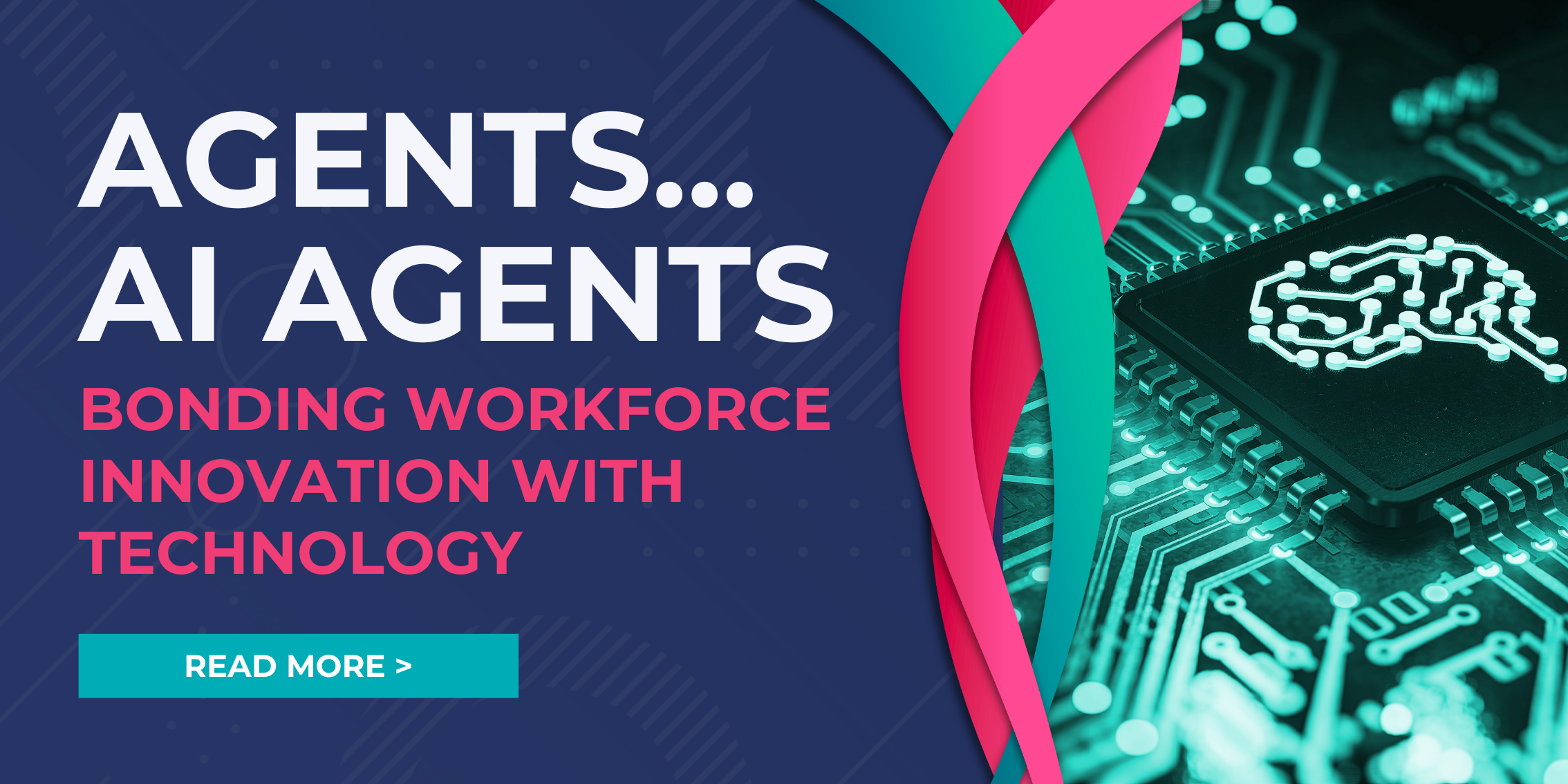
Agents...AI Agents: Bonding Workforce Innovation with Technology
By Christina Anthony, Head of Learning, Interactive Australia
Imagine a world where your HR processes are as smooth and efficient as the latest James Bond escapade, where AI agents—like a modern-day 007—navigate the complexities of the workplace with style, skill, and a touch of humour.
Recently, Idris Elba took centre stage in a ServiceNow campaign, showcasing how these ingenious AI agents are changing the face of HR. With a nod to the iconic spy franchise, Elba shared his vision of how AI can streamline recruitment, personalise employee experiences, and support teams in real time, helping them solve problems faster than you can say, "License to Thrill!"
These AI agents are not just futuristic gadgets; they are your secret weapons in the quest for a dynamic and future-ready workforce. Picture them as your suave companions, effortlessly handling repetitive tasks, answering employee queries, and providing insights that empower HR teams to make data-driven decisions. Just as Bond relies on Q for cutting-edge technology, organisations can rely on AI agents to enhance efficiency and drive innovation.
The Evolving Role of AI Agents in HR
Just like Bond's high-tech gadgets, AI agents break through traditional barriers, transforming HR functions into streamlined, engaging experiences. Whether it's automating resume screening, orchestrating virtual onboarding, or conducting employee pulse surveys, these agents work tirelessly behind the scenes to ensure that your organisation runs like a well-oiled machine—minus the dramatic car chases, of course!
Strategies for Future-Proofing Your Workforce with AI Agents
1. Accelerate Learning Opportunities
Foster a culture of continuous improvement and adaptability. Equip your team with essential skills and understanding of AI tools, ensuring they can collaborate seamlessly with their AI counterparts.
Real-World Application: Implement platforms like Coursera or Udemy to provide courses on AI tools such as ChatGPT, MidJourney, or AutoGPT. For example, companies like PwC have integrated AI training into their employee development programs to enhance data analysis and reporting capabilities. These programs empower teams to apply AI directly to real-world challenges, like automating financial forecasting or improving customer service responsiveness.
How-To Tip: Start with role-specific learning paths. For instance, train your marketing team on using tools like Jasper AI for copywriting and campaign optimisation, while your IT team can explore tools like GitHub Copilot for software development.
2. Incorporate AI Agents as Collaborators
Embrace these digital allies to automate mundane tasks and enhance decision-making. With AI agents on board, your HR team can focus on strategic initiatives that truly matter, because no one wants to get bogged down in paperwork when there are exciting challenges to tackle!
Real-World Application: Leverage tools like Workday or BambooHR, which use AI to streamline payroll, leave management, and performance reviews. For instance, Unilever uses AI agents to screen and assess candidates during recruitment, saving countless hours and ensuring more objective hiring decisions.
How-To Tip: Start small by automating repetitive processes such as email sorting using tools like Microsoft Outlook’s AI-powered categories or Zapier integrations for task management. Gradually expand to more complex applications, like predictive analytics for workforce planning.
3. Cultivate an Inclusive Innovation Culture
Encourage diverse teams to collaborate and brainstorm together, allowing creativity to flow freely. Just as Bond’s team brings together various skills, your workforce can benefit from the unique perspectives of all employees, ultimately leading to groundbreaking innovations.
Real-World Application: Organisations like Google foster inclusive innovation by running design thinking workshops and hackathons. For example, their AI tool, AutoML, was developed to democratize machine learning, enabling teams from non-technical backgrounds to create custom AI models.
How-To Tip: Create innovation labs within your company where diverse teams can explore AI tools like DALL-E for creative projects or Tableau for advanced data visualisation. Use brainstorming sessions to identify unique applications of AI in your business.
Three Key Actions to Differentiate Your Organisation
1. Customise AI Training Experiences
Make training sessions engaging and hands-on, just like a thrilling escapade. Employees should feel like they’re on a mission, learning the ins and outs of AI agents to leverage their full potential.
Real-World Application: Deloitte’s AI Academy offers tailored learning experiences that align with employees’ specific job roles. For instance, their training programs for consultants focus on using AI tools like Power BI for creating impactful client presentations.
How-To Tip: Gamify training by using platforms like Kahoot! to test AI knowledge or create simulations where employees solve problems using AI tools. Reward progress to keep motivation high.
2. Data-Driven Decision-Making
Equip teams with the analytical skills needed to turn AI insights into actionable strategies. Ensure every decision has the strength of data behind it, making strategists as impactful as Bond with a well-timed quip.
Real-World Application: Companies like Netflix use AI to analyse viewer data and create highly personalised content recommendations. Similarly, Walmart leverages AI to optimise inventory management, predicting demand fluctuations with remarkable accuracy.
How-To Tip: Implement user-friendly AI dashboards like Tableau or Power BI to make data insights accessible across all levels of the organisation. Train leaders to interpret these insights and tie them back to business objectives.
3. Diversity and Inclusion as Core Values
Promote diverse hiring practices and inclusive policies. A rich mix of backgrounds and experiences translates to innovation, creativity, and a workplace environment where every employee feels like a star.
Real-World Application: Salesforce is renowned for its inclusive hiring practices and diverse leadership team. Their AI platform, Einstein, is designed with ethical guidelines to ensure unbiased recommendations in hiring and performance reviews.
How-To Tip: Use AI tools like Textio to craft job descriptions that appeal to diverse candidates. Leverage platforms such as LinkedIn Recruiter’s AI capabilities to identify and attract talent from underrepresented groups.
By integrating these strategies, your organisation will not only adapt to the evolving AI landscape but also thrive within it, turning technological challenges into opportunities for growth and innovation.
Conclusion
As AI agents continue to revolutionise the workplace, organisations must embrace them as indispensable allies in the quest for efficiency and innovation.
With a little charm, wit, and a commitment to growth, businesses can navigate the complexities of the modern workplace just as James Bond navigates the high stakes of his world—ready to take on every challenge, mission accomplished, and with a smile.
So, gear up and get ready to unleash the power of AI agents in your organisation, because in this thrilling new world, it’s time to make work feel a little smooth, effective, and exhilarating.
Don’t be shaken, just be stirred to take action !
About the Author: Christina Anthony
 Christina Anthony is an accomplished leader in talent management and organisational development with extensive experience at Fortune 500 companies such as Cisco and SAP. She has designed and led award-winning Leadership Development Programs, recognised with a Silver Award by Brandon Hall. Christina has played a pivotal role in reshaping learning cultures at Ingram Micro and Cushman & Wakefield, driving impactful organisational design that aligns with current and future business needs. At Atlassian, she spearheaded innovative talent management initiatives in the era of AI, integrating advanced technologies to enhance workforce capabilities. Christina holds a Masters in Human Resources Management from the University of Technology Sydney and is certified in Change Management and Agile Project Management by APMG. Currently, she is pursuing a Masters in Coaching Psychology at the University of Sydney, further expanding her expertise in fostering leadership and organisational growth.
Christina Anthony is an accomplished leader in talent management and organisational development with extensive experience at Fortune 500 companies such as Cisco and SAP. She has designed and led award-winning Leadership Development Programs, recognised with a Silver Award by Brandon Hall. Christina has played a pivotal role in reshaping learning cultures at Ingram Micro and Cushman & Wakefield, driving impactful organisational design that aligns with current and future business needs. At Atlassian, she spearheaded innovative talent management initiatives in the era of AI, integrating advanced technologies to enhance workforce capabilities. Christina holds a Masters in Human Resources Management from the University of Technology Sydney and is certified in Change Management and Agile Project Management by APMG. Currently, she is pursuing a Masters in Coaching Psychology at the University of Sydney, further expanding her expertise in fostering leadership and organisational growth.

